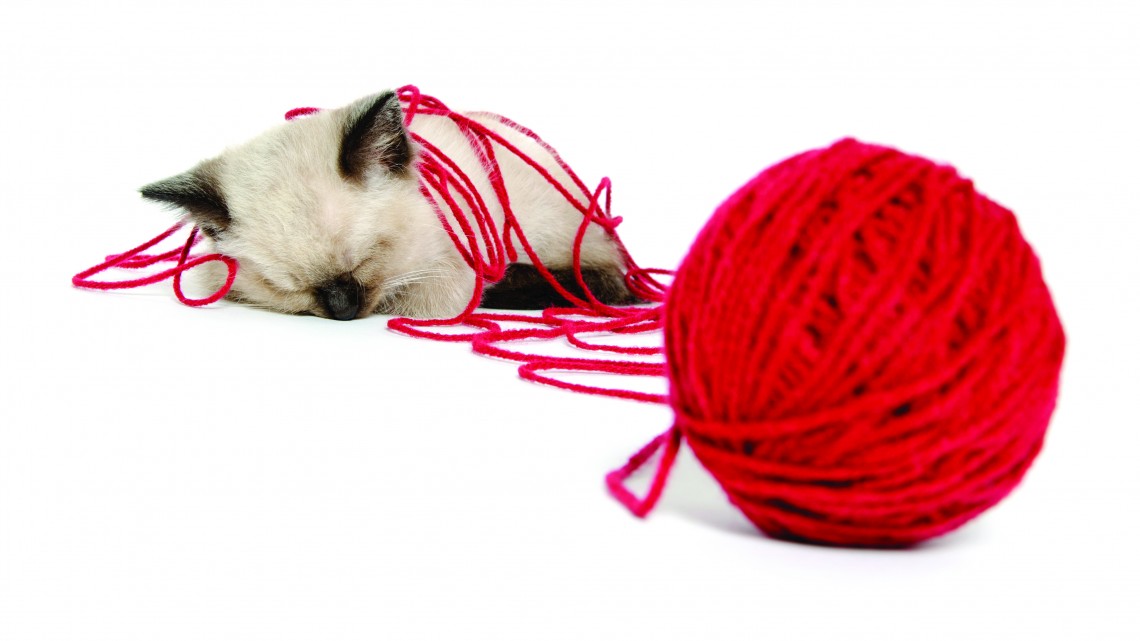Bringing a new little one into your household? Just as you would for a human baby, you need to kitten-proof your home to ensure he stays out of danger.
John and Mr. Universe, his six-month old kitten, were having a great play session with Mr. U’s favorite twisted pipe cleaner toy. The phone rang and John went to answer. When he returned five minutes later, the bright green and yellow toy had disappeared. After a two- hour late night trip to the specialty clinic, and a $1,500 vet bill, the toy had been retrieved – from Mr. U’s esophagus, right at the point where it would have entered his stomach. This story had a happy ending, but it isn’t always so where kittens are concerned. That’s why kitten- proofing your home is a must!
Safe sanctuary
First of all, a young kitten (under four months) should not be allowed free access to the whole house without supervision. Create a play area in one room where the kitten can be confined when you can’t be there to oversee his actions. Provide a cozy warm bed, a cat tree, non-edible toys, food, water and a litterbox (placed at least three feet away from his food and water). Even a bathroom with a window will do. It doesn’t need to be a large space. You can also create a “screen door” for the room with two pieces of wire-coated shelving, joined with nylon electrical ties (left).
In the kitchen
Brooms – Kittens like to chew on broom bristles and these can puncture intestines. Stand brooms on their handles instead of on their bristles.
Stove – Monitor the stove when there are pots on open burners. Kittens can leap on the hot surface and even tip over pots. Turn the handles of skillets and pots away from the front edge of the stove. Never leave an open flame without covering it with a pan. Don’t turn away from an open oven.
Refrigerator – Be aware that when you open the doors, your kitten can get inside quicker than you might imagine and you may not even see him.
Cleaning supplies – Make sure all bottles are securely capped and supplies stored in a cabinet the kitten can’t open. Some kittens and cats are very resourceful and find ways to open cupboards and cabinets. Use childproof locks if you have one of these feline geniuses!
In the laundry room
Dryers – These are so tempting, and so deadly. Always check the dryer and know where your kitten is before starting the cycle.
Detergents – Keep these and other cleaning supplies, especially bleach, in securely locked containers.
In the living room, office and bedroom
Wires – If you have a computer and/or entertainment center, you know how the wires can proliferate. They should be grouped and tied with Velcro or other ties and, if possible, looped onto hanging hooks. A messy tangle of wires not only means your kitten might turn off or unhook valuable equipment; he could also get electrocuted or caught in the wires.
Computers and printers – Keep these covered, again because of the damage a kitten can do (did you really want to send that fax or erase your drive?), and for the danger these pieces of equipment can pose to inquisitive paws. I keep my own cats out of my home office, thanks to the many “changes” they’ve implemented on my computer system. Block access to entertainment center cabinets so your kitten won’t get someplace you can’t reach him.
Office supplies – Keep paper clips and other small objects, such as ink cartridges and rubber bands, locked up. Rubber bands are particularly dangerous if ingested.
Sewing and crafts – Thread and needles are incredibly attractive to kittens, and deadly. Because of the backward facing barbs on a kitten or cat’s tongue, once he starts swallowing a thread, he can’t stop. It can get wrapped around his intestines in a flash. Anything like thread or string (such as price tags on new clothing) can be deadly for a kitten. And forget the cute image of a kitten with a ball of yarn. The same warning goes for buttons, small craft supplies, glue and glue guns.
Always check the dryer and know where your kitten is before starting the cycle.
Window cords – Loop or tie the cords for Venetian blinds and drapes well above a kitten’s reach. Many kittens have inadvertently been strangled after getting caught in the cords.
Ornaments – Anchor all breakable items with earthquake putty, or put them behind closed cabinet doors.
In the bathroom
Keep toilet seats down. Put up a sign if a reminder is needed! Kittens can easily fall in the toilet and there is nothing for them to hang onto if they do. Keep lotion, spray and shampoo bottles securely closed. Q-tips are very tempting to kittens – keep them locked away. Ditto for elastic hair fasteners!
A word about toys
Do not leave interactive toys such as fishing poles or teasers around the house for the kitten to find. These should only be used under supervision and then stored somewhere inaccessible to the kitten. Remove eyes and other loose or small plastic parts from toys so your kitten can’t swallow them. I’ve already mentioned the dangers of pipe cleaner toys, much beloved by many kittens. Be aware if your kitten is chewing on a toy and remove it if the chewing turns into eating.
Kittens are extremely curious and love to explore and investigate everything in their environment. Remove or prevent access to anything that might pose a danger to him, and your home will become a much safer place for your feline toddler!







No Comment